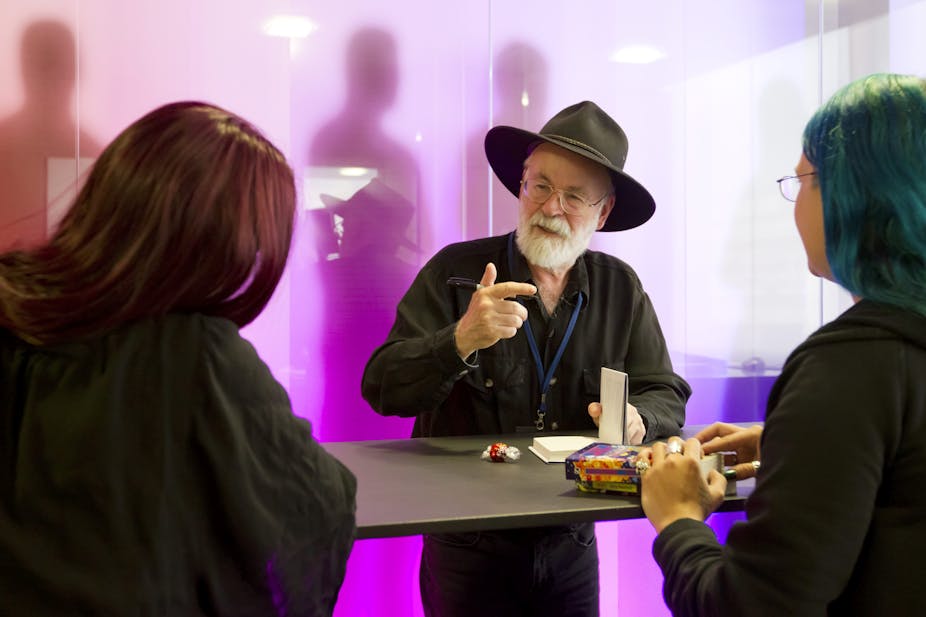Terry Pratchett died surrounded by his family on March 12 2015. As has been widely acknowledged, his legacy was far from confined to the fantastic worlds he created in his books.
After his diagnosis with an Alzheimer’s-related dementia called Posterior Cortical Atrophy (PCA) in 2007 he made the decision to disclose his diagnosis to the media. He then spoke widely of the importance of recognising Alzheimer’s disease, reducing stigma and highlighting the need for more research into its causes. I have experienced this first hand as the leader of an Alzheimer’s research team that benefited from a donation of US$1m from Pratchett himself.
Alzheimer’s disease is just one type of dementia, a degenerative disease which causes problems with thinking and memory. People with the disease have deposits in their brain tissue made up of two different proteins and it is clear that these two proteins are important in the neurodegeneration that leads to memory loss.
However, despite efforts by many research groups since Dr Alois Alzheimer named the disorder in 1904, we still don’t know how it is triggered. Sadly, there is no cure for Alzheimer’s disease and the medicines currently available can only reduce symptoms and cannot stop the deterioration or reverse the damage.
Campaigning for research
Around the time of Pratchett’s diagnosis there was a change in the attitudes towards Alzheimer’s. People really began to discuss both how it felt to be suffering from and caring for someone with the disease. Along with this came awareness of the desperate need for more research funding to understand the disease better.
Pratchett spoke openly about his symptoms and how they affected his life. He not only contributed himself, but also called for increased funding by governments and science funding agencies.
In 2008, we applied for funding from Alzheimer’s Research UK and were delighted to be funded to research the mechanisms that lead to the development of Alzheimer’s disease. We later learned that the funding had been made possible by Pratchett’s donation. We used the money to bring together an international research group to focus our research to understand how one of the proteins involved with Alzheimer’s (Amyloid-beta) interacts with the membranes which surround cells.
Pratchett’s funding allowed us to recruit a number of young scientists to work on this difficult problem, bringing new expertise to the projects. These were exciting times; we worked hard with our collaborators and were able to show that different structures of Amyloid-beta were responsible for the effects on the brain tissues in Alzheimer’s disease.
Films and books show scientific research as an individual pursuit characterised by sudden “aha!” moments. But it actually tends to consist of slow and painstaking work by many scientists working together making small steps towards better understanding. Our work was published and went on to influence the work of other scientists who used it to explore new avenues of research and to build upon our discoveries. We then were influenced by their work, and so on.
The funding made possible by Pratchett’s donation shaped our work and, seven years on, has resulted in further successful funding from government grants and other charities. Without his generous contribution, we would not be at the stage that we are now.
A sea change
It was not just this direct funding that produced so much change. His fervent and determined campaigning initiated change far and wide. He backed the Alzheimer’s society Dementia Friends campaign, famously being photographed holding a sign saying:
IT‘S POSSIBLE TO LIVE WELL WITH DEMENTIA AND WRITE BESTSELLERS LIKE WOT I DO
In 2013, Pratchett started a blog in which he spelled out the devastating effects of the disease on the very core of the sufferers individuality, writing: “Dementia attacks those facets which make us who we are, and it’s a deeply personal attack that defies prediction.”
So for me, Pratchett’s incredibly important legacy was to highlight the need for Alzheimer’s research funding. This resulted in increased backing to charities such as the Alzheimer’s Society and Alzheimer’s Research UK which inevitably allow more researchers to search for the cause and the cure. His efforts also led to serious political changes, bringing dementia into the focus of UK and international governments. Indeed, the G8 promised to aim to develop a treatment or cure by 2025.
So, as we mourn the death of Terry Pratchett as a much-loved writer, we should consider his wider legacy. In the shock of his diagnosis eight years ago, he could have retreated and kept his illness a secret, but instead he chose to go public and lend his voice to an important campaign. He worked tirelessly to raise the need for increased funding for Alzheimer’s disease research and he highlighted the fact that dementia can strike anyone.
He wrote in one of his many novels: “No one is actually dead until the ripples they cause in the world die away.” Although we have sadly lost the eloquent voice of Pratchett himself we must not forget the message he left us with.
We need to continue striving to find the cause and the cure of this disease that affects so many of our friends and family members and keep the importance of this goal in the minds of those with a power to affect it.

